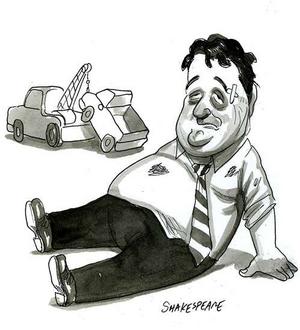2 Views
Bailout Watch 64: Are GMAC, Chrysler and Ford Finance Next?
by
Robert Farago
(IC: employee)
Published: September 23rd, 2008
Share
“We want auto finance companies to be able to raise the money they need to finance more auto purchases.” Well I bet you do, Ms. American Financial Services Association spokeswoman Lynne Strang. But c’mon, are we really talking about Uncle Sam taking over bad car loans? Yes, we are. “The American Financial Services Association is asking Congress to allow auto finance companies and other institutions to tap the $700 billion bailout fund designed for the troubled mortgage industry,” Automotive News [sub] reports. “The trade association, based here [Washington], also is proposing that automobile loans be classified as ‘troubled assets’ along with home mortgages.” Just another lobby group wanting a suck on the federal teat? Well, yes. But this hungry mouth could well get fed. “U.S. purchases of distressed assets would help people, Mr. [Secretary] Paulson told The Wall Street Journal, by enabling lenders to resume making loans for homes, cars and small businesses, and by keeping the economy from sliding into a deep decline that would cost jobs.” When private enterprise depends on government largesse to survive, when an economy depends on bad debt rather than good productivity to thrive… where’s John Galt when you need him?
Robert Farago
More by Robert Farago
Published September 23rd, 2008 7:37 PM


































Comments
Join the conversation
Brent, then just admit that you can't find an objective, non-political source to support your argument, and be done with it. Again, I rely upon industry data to form conclusions. I do not use political journals, on the right or the left, to do my thinking for me. I don't care which way you tilt politically, but your approach is inherently biased, self-limiting and not prone to fact finding. I would no sooner quote the National Review and the AEI for my data than I would cite The Nation or Noam Chomsky. The reasons for this are pretty obvious, or should be.
Pch101...what I meant -- and you know it -- is that you have attempted to steer this conversation away from having to address my points and positions specifically, instead opting for the diversionary tactic of attacking my sources. The facts do not contradict me. You have provided no evidence of facts contradicting my original point. "You are trying to fit a political argument into an economic hole, while missing a whole lot of data in the process. A biased, flawed and ultimately inaccurate approach." I have yet to see you support statements like these with a "how so." And even if we can't agree on why Fannie Mae and Freddie Mac collapsed, those entities were government-affiliated, and the mismanagement of them has directly led us to the brink of so much else. And that mismanagement is not deregulation's fault, or somehow the fault of conservatives asleep at the wheel. Just look at the unbiased log. You seem to argue for the exclusion of any and all political shenanigans as evidence in this discussion. I infer from your stance that you take the simplistic mantra of "more regulation is needed" at face value. That attitude misses the big picture. This stuff does not happen in a vacuum bereft of political meddling and neglect, and it does not happen simply because "there wasn't enough regulation."